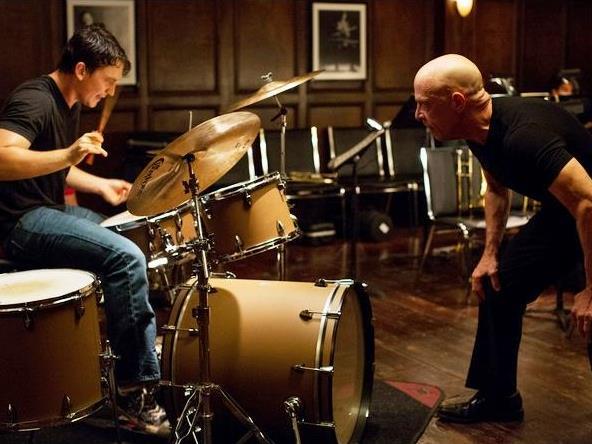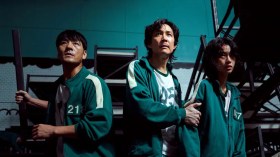Miles Teller as Andrew and J.K. Simmons as Fletcher in the pursuit of peak performance, in Whiplash. Image: Daniel McFadden via Sony Picture Classics.
Whiplash, the new film written and directed by American Damien Chazelle, is billed as a drama about an ambitious young drummer and his terrifying teacher. The older teacher is said to “discover” the 19 year-old jazz player, and then “push him to the brink” of his ability. The older teacher is said to “discover” the 19 year-old jazz player, and then “push him to the brink” of his ability.
I would paint the picture a little differently and say that Whiplash illustrates the impact of an egotistical, artistic, control freak in a position of power over an undergraduate student.
Whether the film-maker was glorifying or denouncing the abuse was largely unclear to me and caused me to reflect on a number of concerns that are relevant to music education in Australia, both in the tertiary sector and earlier in the lives of young musicians.
The fact some people in the audience seemed to find the abuse of power amusing disturbed me, and when the laughter rang out in the theatre, the therapist in me wanted to take that person aside for a quick session. It was far from funny.
The model of teaching being portrayed in Whiplash is sometimes considered to be acceptable in the pursuit of artistic or physical peak achievement.
The “no pain, no gain” mantra suggests it is necessary for students to suffer in order for them achieve their full potential, but there is no evidence to support such a stance. In fact, studies have shown harmonious passion is a better predictor of peak performance than obsessive passion and it is self-evident that the motivations for participating in music have little to do with an expectation of abuse.
Harsh teacher attitudes may be part of the reason that researchers have discovered a declining interest in music studies at school level across seven countries. This is endorsed by studies of students in classrooms, which show that a combination of positive teacher attitude and visible learning goals create prime conditions for learning.
Teaching practice has come a long way since the dominance of behavioural approaches, which were based on the simple dictum that good behaviour should be rewarded and bad behaviour be punished.
As a therapist who investigates the contribution music can make to building flourishing school communities there are two other theoretical perspectives that are relevant for dissecting the key message of Whiplash.
From a humanistic perspective, musicians in schools can create conditions in which students can express themselves creatively and authentically. When music leaders create opportunities for inclusive participation, wellbeing and connectedness are promoted.
That is not the approach adopted in Whiplash and therefore opportunities are missed. But a more disturbing lens to adopt from a therapeutic perspective is the psychodynamic one which investigates the unconscious motivations driving behaviour that are rooted in childhood experiences.
From that perspective, the abuse of power in Whiplash is made possible by the intimate context of the shared music lesson. Sharing music often involves revealing one’s inner world, through a combination of authentic self-expression and emotional engagement. When this is harnessed positively, transformation becomes possible, both in learning and in therapy.
But the combination of power hierarchies and intimacy can also be abused. A number of recent court cases illustrating this have received attention in the UK, with abuse being reported at the elite conservatoriums such as those represented in the movie – the Royal Northern College of Music and Cheltenham College.
Sadly, abuse perpetrated under the guise of music lessons can also occur with younger children, as evidenced in the interim report of the Royal Commission into Institutional Responses to Child Sexual Abuse, currently underway in Australia.
Whiplash can be seen to romanticise the abuse of power. This accusation was also levied at director Darren Aronofsky for his portrayal of artistic obsession in the movie Black Swan (2010). But the gruesome dripping of blood, sweat and tears on the drum-kit of this movie does not realise the same soaring brilliance.
Perhaps what Whiplash does achieve is open a conversation about the limited value of old-fashioned music education in contrast to more informed approaches that are currently being promoted through research-based pedagogy at universities in Australia.
The public nature of the abuse in the movie should also serve as a reminder that abuse – physical or otherwise – is an offence, and that reporting it is a community-wide responsibility.
Katrina McFerran and Daphne Rickson’s new book, Creating Music Cultures in the Schools: A Perspective from Community Music Therapy (2014), has just been released by Barcelona Publishers.
This article was originally published on The Conversation.





